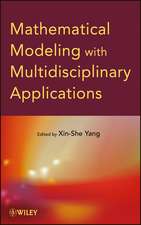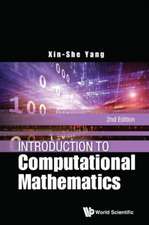Finance with Monte Carlo: Springer Undergraduate Texts in Mathematics and Technology
Autor Ronald W. Shonkwileren Limba Engleză Hardback – 18 sep 2013
The Monte Carlo method is introduced early and it is used in conjunction with the geometric Brownian motion model (GBM) to illustrate and analyze the topics covered in the remainder of the text. Placing focus on Monte Carlo methods allows for students to travel a short road from theory to practical applications.
Coverage includes investment science, mean-variance portfolio theory, option pricing principles, exotic options, option trading strategies, jump diffusion and exponential Lévy alternative models, and the Kelly criterion for maximizing investment growth.
Novel features:
- inclusion of both portfolio theory and contingent claim analysis in a single text
- pricing methodology for exotic options
- expectation analysis of option trading strategies
- pricing models that transcend the Black–Scholes framework
- optimizing investment allocations
- concepts thoroughly explored through numerous simulation exercises
- numerous worked examples and illustrations
| Toate formatele și edițiile | Preț | Express |
|---|---|---|
| Paperback (1) | 390.63 lei 6-8 săpt. | |
| Springer – 11 aug 2016 | 390.63 lei 6-8 săpt. | |
| Hardback (1) | 486.91 lei 6-8 săpt. | |
| Springer – 18 sep 2013 | 486.91 lei 6-8 săpt. |
Din seria Springer Undergraduate Texts in Mathematics and Technology
-
 Preț: 499.87 lei
Preț: 499.87 lei -
 Preț: 413.88 lei
Preț: 413.88 lei -
 Preț: 412.77 lei
Preț: 412.77 lei - 13%
 Preț: 357.85 lei
Preț: 357.85 lei - 15%
 Preț: 494.43 lei
Preț: 494.43 lei -
 Preț: 407.37 lei
Preț: 407.37 lei -
 Preț: 377.88 lei
Preț: 377.88 lei - 15%
 Preț: 404.25 lei
Preț: 404.25 lei - 13%
 Preț: 388.57 lei
Preț: 388.57 lei - 17%
 Preț: 365.99 lei
Preț: 365.99 lei - 17%
 Preț: 367.30 lei
Preț: 367.30 lei -
 Preț: 998.07 lei
Preț: 998.07 lei - 15%
 Preț: 487.90 lei
Preț: 487.90 lei -
 Preț: 391.61 lei
Preț: 391.61 lei -
 Preț: 391.79 lei
Preț: 391.79 lei -
 Preț: 472.90 lei
Preț: 472.90 lei -
 Preț: 422.03 lei
Preț: 422.03 lei - 15%
 Preț: 482.97 lei
Preț: 482.97 lei -
 Preț: 246.75 lei
Preț: 246.75 lei -
 Preț: 410.46 lei
Preț: 410.46 lei -
 Preț: 407.57 lei
Preț: 407.57 lei - 15%
 Preț: 522.34 lei
Preț: 522.34 lei - 20%
 Preț: 338.50 lei
Preț: 338.50 lei -
 Preț: 660.93 lei
Preț: 660.93 lei -
 Preț: 421.91 lei
Preț: 421.91 lei - 15%
 Preț: 504.99 lei
Preț: 504.99 lei - 20%
 Preț: 424.22 lei
Preț: 424.22 lei - 15%
 Preț: 487.74 lei
Preț: 487.74 lei -
 Preț: 460.91 lei
Preț: 460.91 lei -
 Preț: 1072.26 lei
Preț: 1072.26 lei -
 Preț: 390.73 lei
Preț: 390.73 lei -
 Preț: 421.72 lei
Preț: 421.72 lei - 19%
 Preț: 474.42 lei
Preț: 474.42 lei
Preț: 486.91 lei
Preț vechi: 572.83 lei
-15% Nou
Puncte Express: 730
Preț estimativ în valută:
93.17€ • 99.63$ • 77.68£
93.17€ • 99.63$ • 77.68£
Carte tipărită la comandă
Livrare economică 18 aprilie-02 mai
Preluare comenzi: 021 569.72.76
Specificații
ISBN-13: 9781461485100
ISBN-10: 146148510X
Pagini: 272
Ilustrații: XIX, 250 p. 70 illus., 17 illus. in color.
Dimensiuni: 178 x 254 x 20 mm
Greutate: 0.86 kg
Ediția:2013
Editura: Springer
Colecția Springer
Seria Springer Undergraduate Texts in Mathematics and Technology
Locul publicării:New York, NY, United States
ISBN-10: 146148510X
Pagini: 272
Ilustrații: XIX, 250 p. 70 illus., 17 illus. in color.
Dimensiuni: 178 x 254 x 20 mm
Greutate: 0.86 kg
Ediția:2013
Editura: Springer
Colecția Springer
Seria Springer Undergraduate Texts in Mathematics and Technology
Locul publicării:New York, NY, United States
Public țintă
Upper undergraduateCuprins
1. Geometric Brownian Motion and the Efficient Market Hypothesis.- 2. Return and Risk.- 3. Forward and Option Contracts and their Pricing.- 4. Pricing Exotic Options.- 5. Option Trading Strategies.- 6. Alternative to GBM Prices.- 7. Kelly's Criterion.- Appendices.- A. Some Mathematical Background Topics.- B. Stochastic Calculus.- C. Convergence of the Binomial Method.- D. Variance Reduction Techniques.- E. Shell Sort.- F. Next Day Prices Program.- References.- List of Notation.- List of Algorithms.- Index.
Notă biografică
Ronald W. Shonkwiler is a Professor Emeritus in the School of Mathematics at the Georgia Institute of Technology. He received his Masters in Mathematics in 1967, and then his PH.D. in Mathematics in 1970 from the University of Colorado, Boulder. His research includes optimization by Monte Carlo methods, computer geometry, fractal geometry, mathematical epidemiology, neural networks, and mathematical finance. Ronald W. Shonkwiler previously published two books with Springer in the UTM series. "Explorations in Monte Carlo Methods" 2009, ISBN: 978-0-387-87836-2 and "Mathematical Biology, 2nd ed" 2009, ISBN: 978-0-387-70983-3.
Textul de pe ultima copertă
This text introduces upper division undergraduate/beginning graduate students in mathematics, finance, or economics, to the core topics of a beginning course in finance/financial engineering. Particular emphasis is placed on exploiting the power of the Monte Carlo method to illustrate and explore financial principles. Monte Carlo is the uniquely appropriate tool for modeling the random factors that drive financial markets and simulating their implications.
The Monte Carlo method is introduced early and it is used in conjunction with the geometric Brownian motion model (GBM) to illustrate and analyze the topics covered in the remainder of the text. Placing focus on Monte Carlo methods allows for students to travel a short road from theory to practical applications.
Coverage includes investment science, mean-variance portfolio theory, option pricing principles, exotic options, option trading strategies, jump diffusion and exponential Lévy alternative models, and the Kelly criterion for maximizing investment growth.
Novel features:
The Monte Carlo method is introduced early and it is used in conjunction with the geometric Brownian motion model (GBM) to illustrate and analyze the topics covered in the remainder of the text. Placing focus on Monte Carlo methods allows for students to travel a short road from theory to practical applications.
Coverage includes investment science, mean-variance portfolio theory, option pricing principles, exotic options, option trading strategies, jump diffusion and exponential Lévy alternative models, and the Kelly criterion for maximizing investment growth.
Novel features:
- inclusion of both portfolio theory and contingent claim analysis in a single text
- pricing methodology for exotic options
- expectation analysis of option trading strategies
- pricing models that transcend the Black–Scholes framework
- optimizing investment allocations
- concepts thoroughly explored through numerous simulation exercises
- numerous worked examples and illustrations
Caracteristici
Students will learn by doing; implementing concepts of each chapter into code and experimenting with the outcome Exploits the greatest virtue of the Monte Carlo method – providing results for exotic probability models Students will learn a lot about options in addition to usage of mathematical models Focus on Monte Carlo methods allows for students to travel a short road from theory to practical applications Presents "standard" models involving Random Walks with GBM but includes other distributions as well Includes supplementary material: sn.pub/extras










